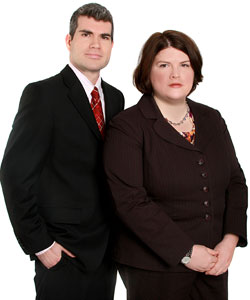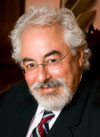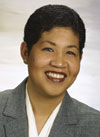 Wisconsin Lawyer
Wisconsin Lawyer
Vol. 82, No. 7, July 2009
 Perhaps you’ve pondered the notion of going solo now and then over the years. But these days you’re wondering, isn’t it crazy to even think about launching a solo practice in this economy?
Perhaps you’ve pondered the notion of going solo now and then over the years. But these days you’re wondering, isn’t it crazy to even think about launching a solo practice in this economy?
Not at all, contends Carolyn Elefant, a Washington, D.C., solo practitioner, publisher of MyShingle.com, and author of Solo by Choice: How to Be the Lawyer You Always Wanted to Be. “I think there are huge opportunities in starting a firm,” she says.
Now more than ever, success as a solo depends on being nimble and flexible, Elefant points out. “You have to be able to identify new trends,” she explains, “and move quickly to capitalize on them.”
She cites the example of a colleague in the D.C. area who launched a virtual law office as part of her family law practice. By helping divorce clients online, she’s able to charge less and still bring in good income – and serve clients who otherwise might not have hired a lawyer at all.
“Because she’s a solo, she could make the decision [to modify her practice] literally overnight,” Elefant says. “She got an ethics opinion and was up and running in eight weeks. In a large firm there would be all these meetings to discuss whether to do this, if it would be a money-maker, and so on.”
Still, going solo demands a healthy dose of caution, says Nerino Petro, who was a solo practitioner for 14 years before becoming the practice management advisor for Practice411, the State Bar’s Law Office Management Assistance Program. “Even in the best of economies,” he notes, “going out on your own is a decision you have to consider carefully.”
He cites a willingness to take risks and a modicum of self-confidence as prerequisites for success as a solo. “And you have to be willing to do everything,” Petro adds. “The way I sum it up is if you’re unwilling to answer your own phone, you shouldn’t be a solo.”
‘Change Is Everywhere’
After 10 years of working in two large Chicago law firms, Annaliese Fleming left a partner position to return to Milwaukee, her hometown, to become a solo practitioner – or, more precisely, a solo-plus-one. “One reason I took the leap,” she says, “is that I wanted to work with my brother,” Jonathon Flynn, who graduated from Marquette University Law School in December 2008. They opened their law office in January.
Striking out on their own in the current economy “was a little scary,” Fleming says, “until I realized we’re uniquely positioned to help clients in this climate because we’re so small. We’re very high tech so we’re able to be highly efficient and cost-effective. Clients are looking for that in these times.”
Their practice focuses on the siblings’ strengths. Fleming’s experience is in commercial litigation, and she was the hiring partner at a former firm, giving her administrative experience. Her brother has a computer science background, a master’s degree in aerospace engineering, and expertise in intellectual property law. They also do estate planning and family law for same-sex couples, and both are trained as divorce mediators.
From the beginning, the goal was to create a different kind of law practice from what they’d known. “We wanted to provide unparalleled service to clients and to enjoy ourselves,” she says.

Annaliese Fleming and Jonathon Flynn use technology to maximize mobility and control costs. Between their separate offices is a large area where these siblings can work collaboratively. “We work out there so we can talk, share ideas, ask questions, and edit each other’s work,” Fleming says. They opened their Milwaukee law office in January 2009.
One key to their approach is using technology to maximize mobility. “We can work from anywhere, anytime,” Fleming notes. “We can turn work around quickly from wherever we are. That gives us a competitive edge.”
Technology-enabled mobility also brings benefits on the personal side. Fleming feels she has more control over her schedule and more work/life balance than she had in large firms. “The way we’re set up,” she explains, “I don’t have to be in the office until six at night. I can leave at four, go home to spend some time with my children [she has two, ages 1 and 3], and then work again after they go to bed. I have a better quality of life.”
Fleming and Flynn use social networking tools, such as Facebook and Twitter, to market their practice, and they’ll soon expand their Web site and launch a blog. Fleming believes it’s critical to share legal information with the general public. “When people have enough information about legal issues and processes,” she says, “they often decide they could use the help of an attorney.”
Another feature the duo built into their practice is the ability “to work collaboratively,” Fleming says, “rather than hierarchically.” This is reflected in their office set-up. Between their separate offices is a large area where Fleming and Flynn spend much of their workday. “We work out there so we can talk, share ideas, ask questions, and edit each other’s work,” Fleming explains.
She sees evidence that, like her and her brother, many lawyers today are looking for ways to make law practice more satisfying for themselves and their clients. “Change is everywhere,” Fleming says. “It’s an exciting time to go solo.”
‘Demonstrate What It Takes’

Wanting to stay on the cutting edge of technology and advertising, Mitch Ablan, La Crosse, went solo. “I can move quickly,” he says, “and I’m the only one making the decisions.” He believes sharing legal information with the public is an important practice-building strategy. “I think having a Web site that demonstrates you can do the job is the best way to go,” he says. “My view is to be educational, and let people know what lawyers do.”

Patrick Sylvester, in his fourth year as a solo, says adaptability and having a strong entrepreneurial streak are essential. Realizing his practice in Wilmette, Ill., “wasn’t geared up to succeed regardless of the economy,” he got the necessary training and added collaborative divorce and family law to his established estate planning practice.

After moving to Madison in 2001, Chan Stroman chose to go solo as a commercial real estate lawyer. Because she knew no one, Stroman plunged into networking. She now has a solid client base and benefits from word-of-mouth advertising. Solos can compete with larger firms today, she says, “if you provide equivalent or better service at a lower price.”
La Crosse attorney Mitch Ablan went solo 15 years ago, after spending 20 years in partnerships. “Technology and advertising had as much to do with it as anything,” Ablan says of his move. “I wanted to stay on the cutting edge.”
Ablan has practiced 25 years longer than Fleming, and he echoes her position on the importance of sharing legal information with the public. He sees that as a practice-building strategy for solos, especially in this age of easy access to information and do-it-yourself tendencies.
Thus, in preparation for his revised Web site launched on May 1 this year, “I spent probably 50 hours putting together information on how things work,” he says. For example, he completed a 30-page tax litigation guide that shows step-by-step processes, which clients could use to handle tax matters themselves. Ablan believes when they see all the options they must sort through and the necessity for having a clear strategy, they’ll choose to hire a lawyer.
“I think having a Web site that demonstrates you can do the job is the best way to go,” Ablan contends. “My view is to be educational, and let people know what lawyers do. The public doesn’t get it, and they need to get it. Lawyers must demonstrate what it takes to get a job done.”
Tax litigation and personal injury cases now comprise about 80 percent of Ablan’s practice. Estate planning, divorces, real estate transactions, and business law had long made up his practice, and still do to some extent. But a few years ago he shifted his primary focus to personal injury and tax litigation. The transition “was a matter of sitting down with staff, getting their input, and making a decision,” he says. “You can do that within an hour. I enjoy that flexibility.”
The one downside of being a solo that Ablan considered before launching his practice was whether he could afford to not share expenses. His per-attorney expenses are “two- or three-fold what they are for other lawyers [who are in partnerships],” he says.
When he started as a solo, he hired lawyers as independent contractors, eventually building that to four attorneys – a move he wouldn’t recommend. “It was very expensive,” he says. “About five years ago I decided to shrink back down to just me.” Because he has a high volume of litigation cases, he needs staff help, consisting of two paralegals, a third-year law student who is his law clerk, and an accountant to assist on tax cases.
Ablan’s practice remains robust, even in a down economy. “I’m going to knock on wood right now,” he adds. He’d like to advertise 10-percent discounts to help clients in tough times but says professional ethics prevent him from flat-out announcing discounts. But he’s giving them to clients anyway, unannounced. It’s another example of what he likes about being a solo.
“I can move quickly,” Ablan says, “and I’m the only one making the decisions. Those are wonderful benefits.”
‘Ask Yourself: Am I an Entrepreneur?’
Adaptability is a strong suit for solos, especially today. Patrick Sylvester, a Wilmette, Ill., attorney who is licensed in Wisconsin, uses that trait to his advantage. He’s been a lawyer for 10 years, including stints working as a law clerk for a Minnesota state court judge, in an estate planning firm in Madison, and then as a trust officer at a Chicago bank.
“I got bored doing that,” Sylvester says, “and wanted to fulfill my entrepreneurial spirit. So I started my own practice.” He’s in his fourth year as a solo.
At first, Sylvester’s emphasis was estate planning, but about a year ago he recognized the need to make changes. “In the current environment,” he points out, “lawyers, and particularly solos, have to ask themselves whether their practice is geared up to succeed regardless of the economy. Early last year I realized I wasn’t set up that way.”
He decided to add collaborative divorce and family law to his practice and got the necessary training. “But here’s the catch,” he says. “I had branded myself as an estate planning lawyer, which is good because clients want specialized professionals. So the question was, how do I go out and market myself to get [family law] clients, without watering down my estate law brand?”
Sylvester’s solution was to create a new Web site. He’d had an estate planning Web site for years, which he valued as a marketing tool. “I invested about $2,500,” he says, “in a completely new, separate Web site that focuses just on collaborative divorce and family law.”
The estate planning side of his practice is slower these days. “People see it as discretionary spending,” he says. “They put it off.” So, besides building his family law practice, he’s investing extra time in contacting his stable of referral sources, reminding them he not only does estate planning, but also post-death administration, and that he has experience in real estate transactions and setting up businesses. Sylvester says he has “different pockets” for referral sources: other attorneys, financial advisors, bankers, insurance agents, accountants, and so on.
“As a solo practitioner,” he says, “I have to be much more deliberate about developing clientele in several different ways: from the Internet, to professional referral sources, to referrals from past clients.”
It comes down to having a strong entrepreneurial streak, as Sylvester sees it. “Before you go solo,” he says, “you have to ask yourself: ‘Am I an entrepreneur, or just a lawyer?’ If the answer is just a lawyer, you probably won’t be happy out on your own.”
Sylvester doesn’t doubt he made the right choice. “Some days I go home at the end of the day, whether it’s four in the afternoon or 10 at night, and I may be exhausted,” he says. “But I can’t believe I get to do what I do for a living. I get to work for myself. That right there is worth a ton of money – just that feeling of satisfaction.”
‘It Was Also Strangely Exciting’
When Chan Stroman moved to Madison in 2001, she decided to take a year off to weigh her options. “Our youngest child was 2,” she says. “My husband had been a stay-at-home dad since she was 8 days old.” It was Stroman’s turn to take some time to be with her three children and think about what she wanted to do next.
She’d practiced law in San Francisco for 14 years, time evenly split between working for large law firms and heading the legal department of a national real estate company. She considered reentering either the law firm or corporate counsel world. But ultimately, Stroman chose another route: going solo as a commercial real estate lawyer.
Surely it was the riskier choice, especially in a city where she knew no one. “It was also strangely exciting,” she says. “I knew if I didn’t do it then, I would never do it.”
Stroman figured she had the skills to succeed as a solo. In addition to 14 years’ experience in commercial real estate, “I had the management skills to run a business,” she says, “based on the administrative responsibilities I’d had heading an in-house legal department.”
She plunged into networking in Madison by attending meetings, seminars, and real estate industry events. “I tried to meet as many people as I could,” she says. “I’m actually kind of introverted, so that was a challenge. But I knew that’s what I had to do.” She also got involved in community service activities and in Leadership Greater Madison, a leadership training program of the Greater Madison Chamber of Commerce Foundation.
Stroman did little billable work her first year while concentrating on building relationships. She also did other marketing: creating a Web site and commercial real estate blog, advertising in local business journals, and taking out a Yellow Pages ad, which she says she regrets doing. The ad attracted lots of calls from people with rental problems who didn’t understand her practice.
“But you have to try everything because you don’t know what will work,” she adds. “Marketing isn’t a point-A-to-point-B kind of thing. You don’t know what’s going to be the serendipitous alignment that leads to hooking up with a client that develops into a good relationship.”
She no longer needs to advertise, having a solid client base and benefiting from word of mouth. Marketing now entails proving herself to clients “every single day on every single project,” Stroman explains, “in terms of quality of work, as well as efficiency, turnaround, and price.”
By offering the right mix of those qualities, Stroman feels solos can be highly competitive with larger firms today “if you provide equivalent or better service at a lower price,” she says. “Clients are more cost-conscious.”
All in all, launching a solo practice as a new lawyer in town has worked out well. Says Stroman, “I’m really happy that this has turned out to be a third phase of my legal career.”
‘You Have More Freedom’

Martin Ditkof, Brookfield, undertakes a product-safety audit of a mining shovel manufactured by one of his clients. He based his niche practice on experience gained as in-house and general counsel at a manufacturing firm that downsized. Ditkof says, “They agreed to lay me off and outsource the legal function to me.” That was eight years ago; he’s been turning away clients for the last three. “It’s a responsiveness issue,” he explains. “If you want to be a solo practitioner and compete with the big guys, you have to make the effort and the commitment to be on all the time.”
Martin Ditkof’s law office may be modest; it’s his wife’s former sewing room in their Brookfield home. Still, as a solo practitioner, “my client base includes companies [with annual revenues] in the hundreds of millions, even billions of dollars,” he says.
The key to his success is that he has a niche that adds value for clients. As a former general counsel, he understands the issues his clients face. Plus, he has “very good references that give even the bigger companies a comfort level that I know what I’m doing,” Ditkof says, “and can do it efficiently.”
He’s been a solo working out of his home office, without support staff, for eight years, ever since he left a Milwaukee manufacturing firm where he’d been in-house counsel for 13 years, three of those as general counsel. As that company downsized in 2000, “I didn’t think they needed a full-time general counsel,” Ditkof points out. “They agreed to lay me off and outsource the legal function to me. I’d always wanted to hang out a shingle.”
Ditkof focuses his practice in two areas: acting as outside general counsel for midsize companies, many of which retain him on a set monthly fee, and coordinating national asbestos cases for two clients. He’s been turning away new clients for three years, with minor exceptions.
“It’s a responsiveness issue,” he explains. “In today’s world, clients expect a response now. If you want to be a solo practitioner and compete with the big guys, you have to make the effort and the commitment to be on all the time.”
Besides handling legal matters for clients, Ditkof offers them another skill-set stemming from his general counsel days: legal project management. When a matter requires legal expertise he doesn’t have, he hires another attorney. “The client pays [for that outside help],” he explains, “but I supervise the project. It’s my job to make sure it’s done efficiently and effectively and comes in on budget.”
For lawyers who, like him, have a niche, Ditkof believes now is an opportune time to go solo. “Any time clients are looking to change,” he says, “there’s an opportunity for lower-cost providers. Three years ago, I don’t think you could go solo and convince people to hire you because you’re less expensive. You had to show you had a different quality or experience level – and, by the way, you’re less expensive. That’s changed now. Clients are willing to listen just on the cost basis.”
Still, you need the experience level to impress clients, and you need patience. “Clients aren’t going to flip the switch quickly,” he says. “They’ll take their time.”
To Ditkof, the best part of being solo is that, despite clients’ demands, “you have more freedom to do what you want, when you want,” he says. Now that he’s in a home office, does he miss his former general counsel job, which took him to a dozen countries around the world? “That job was great,” he replies, “but this one is better.”
Wisconsin Lawyer
